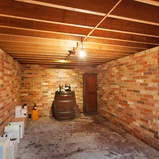luckybeagle
Making sales and brewing ales.
Hi all.
I brew a lot of Belgians, and have been pretty pleased with my results, but lately I've been trying to copy CSI's clone recipes for some of my all time favorites and see that many of them require 6 to 12 months + cellaring times in the 50 to 60F range. In particular, I'm thinking Rochefort 10, Westvleteren 12, Maredsous 8 and 10, Chimay Grand Reserve, etc etc...
I don't mind the wait so much, but my chest freezer w/inkbird is always occupied with fermenting beer, and my kegerator is holding...well... kegs.
I'm pretty much out of space in my house for non essential appliances and don't have a garage or basement, so my options to store my beer for "cellaring purposes" are severely limited. I could stuff them in a rubbermaid in the crawlspace, which still gets a bit warm in the summer months, attempt to dig a deep hole behind my shed as a root cellar (wife might not like that too much), rotate them from the crawlspace in the summer (65F or so) to the attic in the winter (55F or so), or store at plain old room temp in the closet beneath the stairs. None of those are truly fantastic options, so I'm at a loss...
What do you all do for your "special beers" that benefit from lots and lots of bottle conditioning times?
I brew a lot of Belgians, and have been pretty pleased with my results, but lately I've been trying to copy CSI's clone recipes for some of my all time favorites and see that many of them require 6 to 12 months + cellaring times in the 50 to 60F range. In particular, I'm thinking Rochefort 10, Westvleteren 12, Maredsous 8 and 10, Chimay Grand Reserve, etc etc...
I don't mind the wait so much, but my chest freezer w/inkbird is always occupied with fermenting beer, and my kegerator is holding...well... kegs.
I'm pretty much out of space in my house for non essential appliances and don't have a garage or basement, so my options to store my beer for "cellaring purposes" are severely limited. I could stuff them in a rubbermaid in the crawlspace, which still gets a bit warm in the summer months, attempt to dig a deep hole behind my shed as a root cellar (wife might not like that too much), rotate them from the crawlspace in the summer (65F or so) to the attic in the winter (55F or so), or store at plain old room temp in the closet beneath the stairs. None of those are truly fantastic options, so I'm at a loss...
What do you all do for your "special beers" that benefit from lots and lots of bottle conditioning times?




